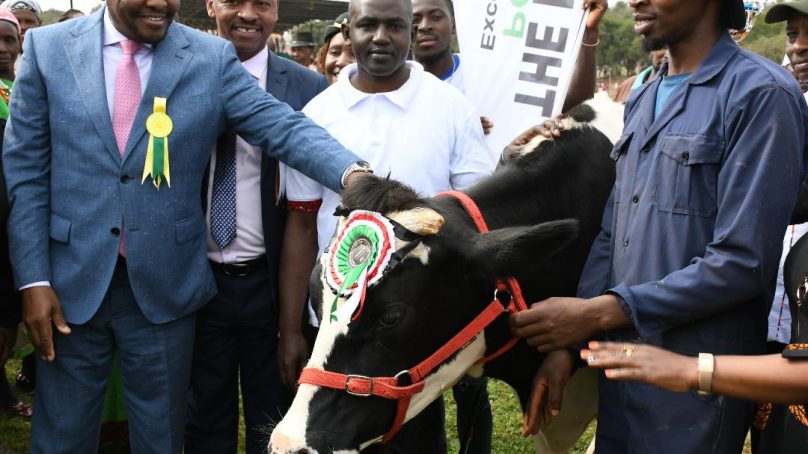
Kenya has announced plans to restock the National Strategic Food Reserve by purchasing food stocks directly from farmers as the country prepares to harvest 70 million bags of maize this year.
Cabinet Secretary for Agriculture and Livestock Development Mutahi Kagwe says the move would not only guarantee food security for the country but also provide farmers with a ready and reliable market for their produce.
“Our national food security has remained stable, with improved availability and reduced prices for staple foods. As we approach the bumper harvest season, the government will restock the National Strategic Food Reserve. This will guarantee food security for the nation and provide farmers with a ready market for their produce,” Kagwe said.
This year’s harvest, which has been termed as historic, exceeds the 2024 harvest by three million 90-kilogramme bags. The anticipated 70 million bags are more than double the 34.3 million bags of maize harvested in 2022.
Speaking when he officially opened the 57th edition of the Central Kenya Agricultural Society of Kenya Show at Kabiru-ini showground in Nyeri on Friday, Kagwe attributed the increased production to favourable weather conditions and timely provision of subsidised fertiliser and other inputs to farmers by the government.
Kagwe said that the state had so far availed 21.3 million bags of fertiliser valued at Ksh53.25 billion through the fertiliser subsidy programme. For the 2025 long rains, the cabinet secretary said that some 6.9 million bags of fertiliser had been availed to farmers.
“This has reduced fertilizer prices by up to 67 per cent per 50-kilogramme bag and boosted production of key commodities,” Kagwe stated.
He revealed that there were plans to provide 12.5 million bags of subsidised fertiliser for the 2026 seasons across all 1,450 wards.
Kagwe reiterated the government’s commitment to making agriculture a profitable venture for the farmer by providing market interventions and subsidies.
He noted that the introduction of the Kenya Integrated Agriculture Management Information Systems would ease access by farmers to subsidised fertiliser and other farm inputs under the government’s e-voucher system.
Commenting on the tea sector, Kagwe said that the government is still pursuing new markets in North and South Africa, the Middle East and East Asia.
Regarding Coffee, the cabinet secretary said that the government had distributed improved seedlings, renovated pulping stations and factories and tripled fertiliser allocation from 50,000 to 150,000 bags.
He said his ministry has also lined up a series of bold reforms that are set to place the sub-sector on the path to recovery.
“These include the online trading platform we are set to launch soon for transparency, local packaging and branding and full traceability to meet European Union Deforestation Regulation (EUDR) compliance by the end of this month,” he said.
For the dairy sub-sector, the cabinet secretary said that his ministry is distributing milk coolers nationwide and that to bring down the cost of livestock feeds, the government has zero-rated yellow maize and soya imports used for feed manufacturing.
He further said that plans were underway to increase feedstock production under the land commercialization initiative (LCI) that will see government to lease idle government land to private investors to plant yellow maize for livestock feed production.
On the multibillion horticulture and fresh produce sector, Kagwe said that his ministry is enhancing compliance with European Union requirements on the zero-tolerance policy on false coddling moth by implementing stringent pest management measures for exports.
In addition, Kagwe said Kenya is still negotiating lower export duties, and expanding freight capacity to support exporters.
- A Tell Media / KNA report / By Wangari Mwangi and Diana Odipo







